Tag Archive for: #EducationReform

MBTAAnalysis: A look inside the MBTA
0 Comments
/
The MBTA shuttles over a million passengers a day around Greater…
 https://pioneerinstitute.org/wp-content/uploads/CloseupClock-1.jpg
739
1244
Mary Connaughton
https://pioneerinstitute.org/wp-content/uploads/logo_440x96.png
Mary Connaughton2017-02-20 12:34:192017-02-21 09:47:58The Clock is Ticking…….
https://pioneerinstitute.org/wp-content/uploads/CloseupClock-1.jpg
739
1244
Mary Connaughton
https://pioneerinstitute.org/wp-content/uploads/logo_440x96.png
Mary Connaughton2017-02-20 12:34:192017-02-21 09:47:58The Clock is Ticking…….
EdChoice’s Robert Enlow on School Choice
In this episode of The Learning Curve, co-hosts U-Arkansas Prof. Albert Cheng and Alisha Searcy interview Robert Enlow, president and CEO of EdChoice. Mr. Enlow discusses his decades of leadership in school choice advocacy, from his early work with the Milton and Rose Friedman Foundation to spearheading policy reforms nationwide.

Frontier Institute’s Trish Schreiber on School Choice & Charter Schools in Montana
In this episode of The Learning Curve, co-hosts U-Arkansas Prof. Albert Cheng and Alisha Searcy interview Trish Schreiber, senior fellow in education at the Frontier Institute in Montana. Schreiber shares her journey from Silicon Valley to Montana and her passion for expanding educational opportunities.
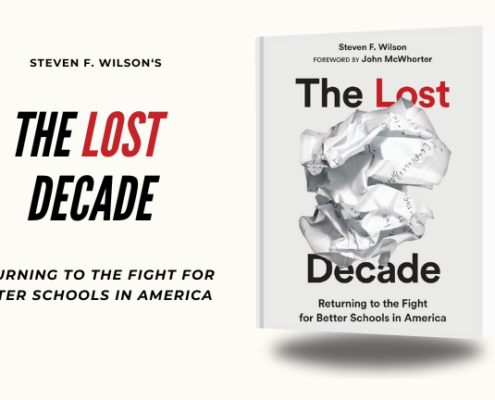
The Lost Decade Calls for Replacing “Social Justice Education” with Education Rich in Liberal Arts, includes a foreword by John McWhorter
Book finds that marginalized students suffer most from turn away from academics
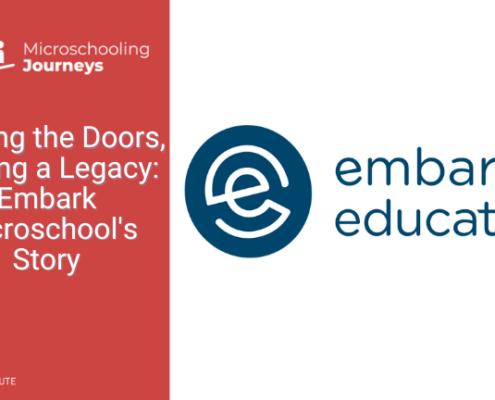
Closing the Doors, Leaving a Legacy: Embark Microschool’s Story
Microschools launch and close more easily than traditional schools—is that a feature or a bug? This week on Microschooling Journeys, Brian Hyosaka shares the story of Embark Micro Middle School in Denver, a tuition-free, philanthropy-backed microschool closing after six successful years. Rather than charge tuition or become a charter, they chose to "go out on top." Embark’s legacy includes inspiring hundreds of educators. Folks, this is where we leave our limited podcast series. Microschooling Journeys has come to an end, if you listened, thank you, please give me a shout, I’d love your feedback. This is Curious Mike signing off!

Steven Wilson on The Lost Decade: Returning to the Fight for Better Schools in America
In this episode of The Learning Curve, co-hosts U-Arkansas Prof. Albert Cheng and Alisha Searcy interview Steven Wilson, a senior fellow at Pioneer Institute and a leading voice in education reform. Mr. Wilson discusses his journey into K-12 education policy, reflecting on his early work with Gov. Bill Weld and the landmark 1993 Massachusetts Education Reform Act (MERA), which helped propel the state’s schools to national and international success. He explores the intersection of K-12 curricula with race- and class-based politics and discusses themes from his upcoming book, The Lost Decade.
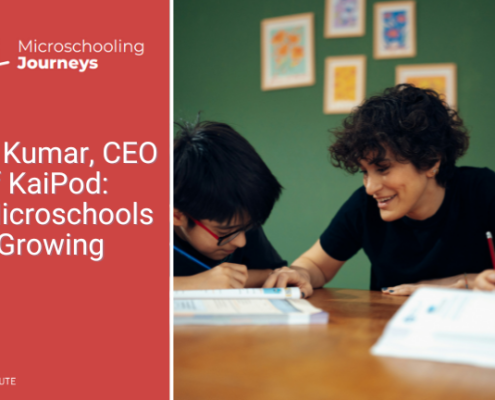
Amar Kumar, CEO of KaiPod: 70 Microschools and Growing
In episode four of Microschooling Journeys, Curious Mike interviews Amar Kumar, the founder and CEO of KaiPod, a network of 70 microschools across the country. They explore what makes KaiPod distinct—whether it’s culture, curriculum, or teacher hiring practices. Amar discusses how he measures and ensures the quality of each school. Next week, Mike heads to Florida to visit Rain Lily Microschool, part of the Wildflower network.
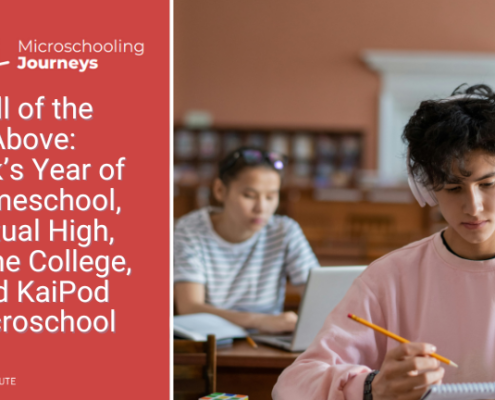
All of the Above: Nick’s Year of Homeschool, Virtual High, Online College, and KaiPod Microschool
In this week's episode of Microschooling Journeys, Curious Mike chats with Nick, a 15-year-old homeschooler dual-enrolled at VLACS and Arizona State University online, pursuing a business degree. Nick shares his unconventional education path, why he left traditional school after kindergarten, and how KaiPod Microschool fits into his journey. Will he return next year? What are his future aspirations? Tune in to find out! Plus, stay tuned for next week’s episode with KaiPod CEO Amar Kumar.

Navigating Personalized Learning: Meghan’s Role as a Guide at KaiPod Microschool
In the latest episode of the Microschooling Journeys podcast, Curious Mike interviews Meghan, a dynamic "Guide" at KaiPod Microschool in Nashua, NH. Meghan shares her transition from public school to microschool and how she creates a welcoming, warm environment for her 14 students with individually curated curriculums. Discover Meghan's unique approach to education and stay tuned for more exciting episodes featuring Nick, a 15-year-old KaiPod student, and KaiPod CEO Amar Kumar.
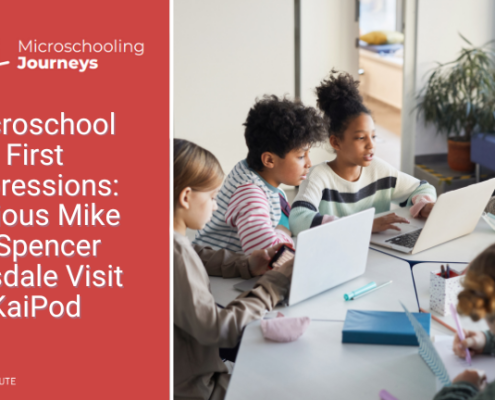
Microschool First Impressions: Curious Mike & Spencer Blasdale Visit KaiPod
In the premiere episode of Microschooling Journeys, Curious Mike joins his friend Spencer Blasdale, a former school leader and former CEO of SchoolWorks, on a road trip to KaiPod Microschool in Nashua, New Hampshire. With years of experience evaluating schools—public, private, and charter—Spencer brings a sharp, seasoned perspective to his first encounter with a microschool. At Kaipod, they observe a unique setup: 14 students guided by two dedicated adults in a personalized, community-driven learning environment. Spencer’s impressions spark key questions: How does this innovative model compare to traditional schools? Would he have considered it for his two daughters? Join us for this engaging exploration of microschooling! Stay tuned for future episodes that deepen the journey: Episode 2 features Meghan, a KaiPod guide; Episode 3 spotlights Nick, a 15-year-old student at KaiPod; and Episode 4 concludes with CEO Amar Kumar, sharing his vision for revolutionizing education through microschools.

Tim’s Take: An Education Reform Stalwart Takes a Curious Look at Homeschoolers With ESAs
This week on Homeschooling Journeys, Curious Mike interviews Tim Daly, CEO of Education Navigator and former CEO of TNTP. Mike is hunting for some Big Picture perspective. Intrigued by what he’s seen from ESAs, he chats with old friend Tim. The “old” Education Reform Alliance has died out somewhat; what can this new ESA sector learn?

U-OK’s Dan Hamlin on Emerging School Models & Learning Loss
This week on The Learning Curve, co-hosts Alisha Searcy of DFER and U-Arkansas Prof. Albert Cheng interview Dan Hamlin, an Associate Professor in the Department of Educational Leadership and Policy Studies at the University of Oklahoma. Prof. Hamlin offers his insights on the state of K-12 education policy and reform. He shares how his academic experiences and research shaped his philosophy on education and informed his work with Harvard PEPG’s “Emerging School Models” conference.

NH Gov. Chris Sununu on School Choice
This week on The Learning Curve, co-hosts Alisha Searcy of DFER and U-Arkansas Prof. Albert Cheng interview New Hampshire Governor Christopher Sununu. Gov. Sununu discusses his upbringing in a well-known political family and how the influence of his father, a former governor and White House chief of staff, and his brother, a former U.S. senator, has shaped his public service.
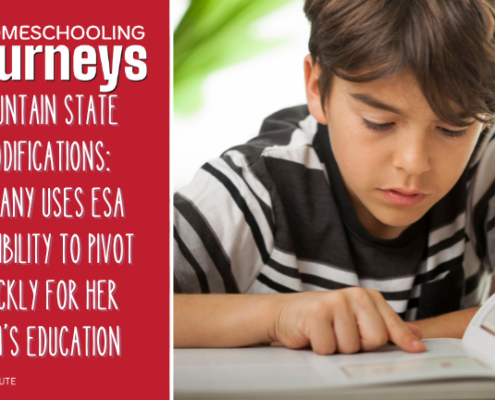
Mountain State Modifications: Tiffany Uses ESA Flexibility to Pivot Quickly For Her Son’s Education
This week on Homeschooling Journeys, we meet Tiffany Hoben from West Virginia. Curious Mike chatted with her twice: once in June 2024, and again in October 2024. This October episode shows the nature of homeschooling: plans change. That cuts both good and bad. One cool opportunity disappeared; but at roughly the same time, a new need emerged, as well as the perfect educator to solve that problem. Tiffany, like other homeschoolers using Education Savings Accounts (ESAs), has a variety of experiences: she gets to personalize her son's education, but in doing so, experiences friction that comes both from DIY and from the red tape of actually making purchases (software challenges and bureaucratic hoops). Her $4,900 “Hope Scholarship” is used for her son’s biology curriculum, rock climbing, an AI-aided writing class, and above all, a specialized phonics tutor. She is optimistic about the future of ESAs for homeschoolers in West Virginia.

Homeschooling with Hope: Katie Switzer’s ESA Experience
In this episode of Homeschooling Journeys with Curious Mike, Katie Switzer from West Virginia shares her compelling story as a homeschooling mom navigating the state's Hope Scholarship program. She recounts her pivotal role as a plaintiff in the legal battle that saw the scholarship declared unconstitutional by a West Virginia Circuit Court, only to be appealed to the state Supreme Court. Katie also sheds light on the frustrations and red tape surrounding the reimbursement process, a challenge many parents face when trying to access funds through the scholarship. Despite the hurdles, Katie successfully uses her Hope Scholarship for her children’s education, covering basic curriculum, speech therapy, piano lessons, and online classes with a beloved teacher, Miss Ashley. This episode provides an eye-opening look at the struggles and successes within the evolving landscape of school choice and education savings accounts.

Lynch Foundation’s Katie Everett on School Finance Model for Catholic Schools & School Choice
This week on The Learning Curve, co-hosts U-Arkansas Prof. Albert Cheng and Mike Goldstein interview Katie Everett, the Executive Director of the Lynch Foundation. Ms. Everett shares her journey into K-12 education reform and discusses the influential vision of Carolyn and Peter Lynch, and their foundation's role in shaping education policy in Massachusetts and beyond.

MA Teacher James Conway & High School Grad Ela Gardiner on MCAS Testing
The Learning Curve, co-hosts U-Arkansas Prof. Albert Cheng and Meredith Coolidge of DFER - MA interview James Conway, a World History and Psychology teacher at Revere High School, and Ela Gardiner, a freshman at Hobart and William Smith Colleges and Wellesley High School alumna.

Study Finds Results of International Assessments Confirm Quality of MCAS
Economist and Fulbright Scholar concludes Massachusetts should return to participating in international testing as a benchmark for state results and internationally competitive economy

PRI’s Lance Izumi on The Great Classroom Collapse
Lance Izumi delves into his latest book, "The Great Classroom Collapse: Teachers, Students, and Parents Expose the Collapse of Learning in America's Schools". He discusses why, despite decades of education reforms and vast spending, many American students remain underprepared in critical subjects like reading and math.

From Stress to Success: How Daniella Transformed Her Son’s Learning with ESA Funds
This week on Homeschooling Journeys Curious Mike talks with Daniella Moreci-Pack, an Arizona mom utilizing her state's Education Savings Account (ESA) to homeschool her son with ADHD. Daniella shares how she spends ESA funds on special needs therapies, curriculum products, and in-person enrichment activities like karate and dance classes. She explores key themes, including the flexibility of homeschooling, the initial anxiety of leaving traditional schooling, and the common shift from structured schedules to more child-led learning. Daniella also discusses navigating ESA red tape, as new rules add bureaucratic hurdles. Tune in to hear highlights of Daniella's approach and resilience in overcoming these challenges to give her child a personalized education.

AFC’s Denisha Allen on School Choice & Black Minds Matter
Denisha shares her journey and the motivations behind founding Black Minds Matter, a national movement dedicated to celebrating Black excellence and promoting high-quality educational options for Black students. She delves into the politics of urban school reform, highlighting the challenges posed by race and class-based achievement gaps and the political influence of teachers' unions.

From Garden to Table: How Alicia Garcia Reshapes Home Ec with ESAs
In the debut episode of Homeschooling Journeys, we meet Alicia Garcia, the founder of Project Flourish Community. Alicia offers an innovative Home Ec experience where students participate in hands-on learning, from picking ingredients in her backyard to cooking healthy meals. As both a provider and user of Education Savings Accounts (ESAs), Alicia shares her unique perspective on homeschooling. The episode delves into the challenges of setting up ESA payments and the benefits of specialized learning. Alicia also touches on a heartwarming story of how she used ESA funds to help her introverted son join a local stage musical.

National Alliance’s Starlee Coleman on Public Charter Schools
Starlee Coleman discusses her role as CEO of the Texas Public Charter Schools Association, highlighting the growth of charter schools in Texas, as well as the broader efforts to expand school choice.

Houston Supt. Mike Miles & Urban School Reform
Mr. Miles reflects on his lifelong dedication to public service, starting as a soldier, then a diplomat, and later as an educational leader. He shares insights into his family background and formative experiences that shaped his commitment to serving the public.

Georgetown’s Dr. Marguerite Roza on Federal ESSER Funds & the Fiscal Cliff
Dr. Roza explores the complexities of education finance and its impact on American K-12 education. She outlines the three phases of school funding over the past 40 years and their effect on equity and student achievement. She highlights that only about half of the K-12 education dollars reach student instruction, with significant funds absorbed by the ever-expanding education bureaucracy.

Steven Wilson on Charter Public Schools
Mr. Wilson delves into his extensive background, including his tenure at Pioneer Institute, his work with Governor Bill Weld, and his contributions to the landmark 1993 Massachusetts Education Reform Act. Steven shares insights into the high academic expectations and success of Boston's charter schools, emphasizing the importance of recruiting and retaining quality teachers and principals.

Johns Hopkins’ Ashley Berner on Educational Pluralism & Democracy
Johns Hopkins’ Institute for Education Policy director, Dr. Ashley Berner discusses educational pluralism's role in improving K-12 performance, exploring European models and the impact of U.S. school choice programs. Dr. Berner analyzes universal ESAs and vocational-technical schooling, addressing persistent academic struggles and civic knowledge gaps.

U.S. Chamber Foundation’s Hilary Crow on K-12 Civics Education
U.S. Chamber Foundation VP, Hilary Crow discusses the state of K-12 civics, emphasizing the Chamber Foundation’s role in addressing America’s wide civic education deficits. Crow highlights a recent national civics survey, alarming civic literacy gaps, and links between political unrest and our nation’s educational shortcomings in K-12 civics.

Tufts Prof. Elizabeth Setren on METCO’s Proven Results
Prof. Setren discusses her recent study of METCO, a pioneering voluntary school desegregation program under which Massachusetts students in Boston and Springfield are bused to surrounding suburban districts. She discusses METCO's history, the academic performance of students in the program, enrollment challenges, long-term benefits, and disparities among students.

Dr. Adrian Mims on The Calculus Project & STEM
Dr. Mims navigates through the contentious "math wars" and underscores the pivotal role of Algebra I as a gateway to higher math. He also evaluates the negative impact of Common Core math standards, and proposes strategies to combat pandemic-induced learning setbacks and bridge the gap in math proficiency between American students and their international counterparts.

BC’s Dr. Matthias von Davier on TIMSS & K-12 Global STEM
Dr. von Davier explores his educational background and its influence on directing TIMSS & PIRLS, shedding light on psychometrics and standardized testing. He discusses the shift in education policy's focus, the global education data landscape, and the pandemic's effects on K-12 education around the world. Dr. von Davier addresses the alarming decline in U.S. educational performance, emphasizing the urgency to bridge achievement gaps. Drawing from international experiences, he highlights global examples for American policymakers from higher-performing countries, emphasizing the crucial links between education, skills, and innovation on the global economy.
